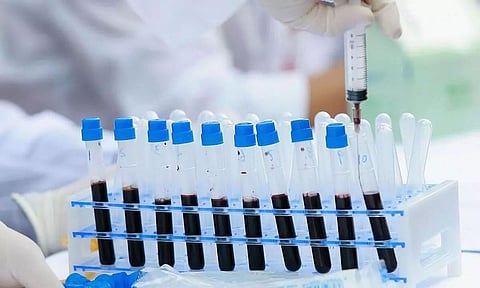
- Home
- Live Blog
- Breaking News
- Top Headlines
- Cities
- NE News
- Sentinel Media
- Sports
- Education
- Jobs

California, USA:
According to experts, a simple blood test called 'Galleri' that can identify more than 50 distinct forms of cancer before they exhibit any clinical signs or symptoms is accurate enough to be employed as a multi-cancer screening test.
Seven years ago, scientists at Illumina, a DNA sequencing firm based in San Diego, were conducting research to look for DNA fragments in pregnant women's blood that may indicate chromosomal abnormalities.
A pathologist noticed something unexpected in ten of the blood samples throughout the study. This made no sense to the researchers. However, there was considerable speculation that cancer was involved.
Further investigation revealed that one of the ten individuals had got a cancer diagnosis, and others in that subset had cancer as well – despite the fact that they had no symptoms.
This persuaded Illumina's executives to form GRAIL, a spin-off firm that merged breakthroughs in human genetics with machine learning data analytics, in 2016.
This culminated in the creation of a novel blood test called Galleri by GRAIL, which can detect early stages of cancer before symptoms appear.
GRAIL, Inc. (California, USA), the business that devised and financed the study, has just made the multi-cancer early detection test accessible in the United States by prescription only, to augment other, current screening techniques for breast, cervical, prostate, lung, and bowel cancers.
In clinical trials, an older version of Galleri was proven to be capable of identifying more than 50 types of cancer with a single blood sample, 45 of which do not have mandated screenings.
More than 134,000 people have taken part in GRAIL's blood test research trials. The examination also identifies the location of the malignancy.
"When a cancer signal is detected in these trials, the test also pinpoints where the cancer is located in the body with high accuracy," Dr Joshua Ofman, chief medical officer and head of external affairs at GRAIL, told Healthline. "This helps healthcare providers to determine next steps for diagnosis and care."
Many of the cancers that the test can diagnose do not have screening tests, such as liver, pancreatic, and esophageal cancers, which are among the deadliest and where early diagnosis might save lives.